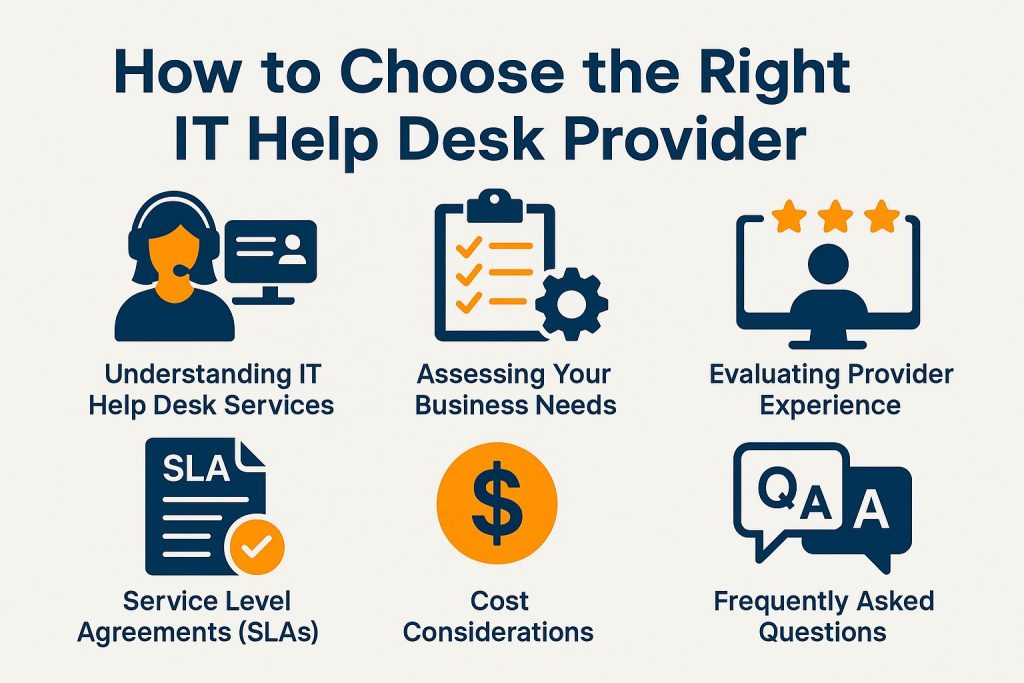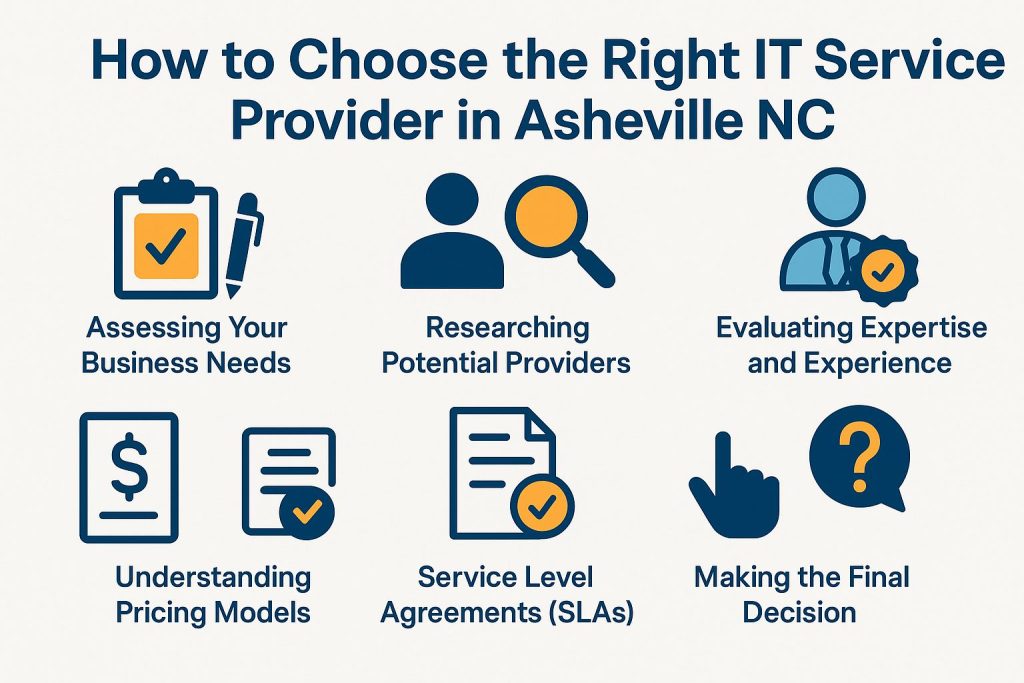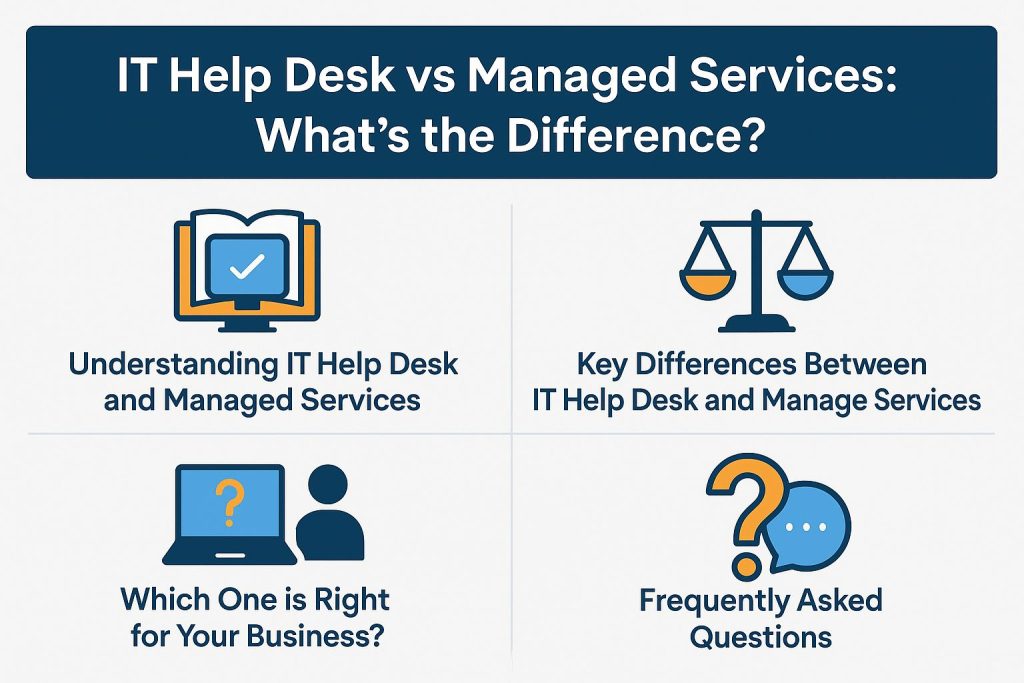Top Benefits of Partnering with a Managed IT Services Provider
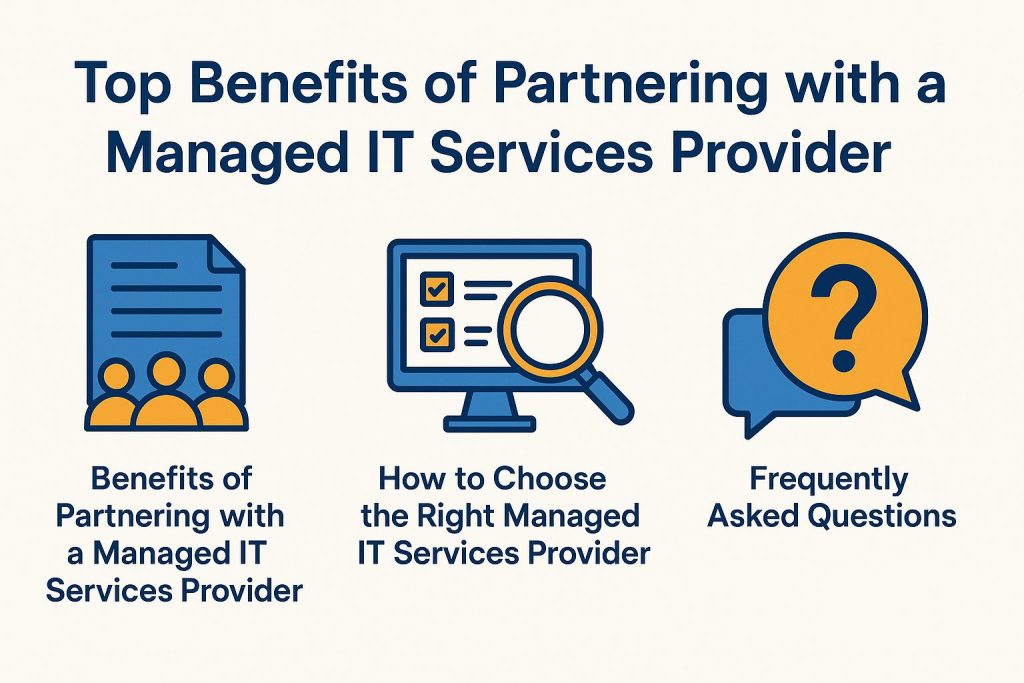
Managing IT infrastructure is challenging for businesses. Managed IT Services provide a partnership. This partnership enhances efficiency, supports technology, and fosters innovation. This article discusses the benefits of working with a Managed IT Services Provider. These include cost savings, access to advanced technology, strong cybersecurity, and 24/7 support. Furthermore, it provides guidance on selecting the appropriate provider to meet specific business needs, ensuring that organizations can make informed decisions for their future.
Explanation of What Managed IT Services Are
Managed IT Services are when a third-party provider manages all of an organization’s IT needs. This arrangement enables businesses to leverage technical expertise to enhance operational efficiency, improve security, and ensure business continuity.
These services encompass a wide range of offerings, including proactive maintenance, IT support, outsourced IT, data backup, and disaster recovery, all tailored to align with the specific IT strategies and governance frameworks of the organization.
Along with these foundational components, managed IT services frequently include network monitoring, cybersecurity measures, compliance management, and proactive monitoring. Together, these elements serve to protect sensitive data and mitigate risks effectively.
By employing advanced tools and techniques, the service provider can transform an organization’s IT infrastructure into a robust system that streamlines operations while adhering to regulatory requirements. This holistic approach to IT management helps businesses focus on their strengths. It keeps technology strong and ready for the future.
Consequently, this fosters a proactive environment where potential issues are addressed before they escalate.
Benefits of Partnering with a Managed IT Services Provider
Partnering with a managed IT services provider offers numerous advantages that can greatly enhance a company’s operational capabilities.
This collaboration allows for cost savings through optimized resource allocation and improved security via specialized IT support and proactive risk management.
Furthermore, these services facilitate scalability for businesses, ensuring they can adapt to evolving requirements without sacrificing quality or performance, a principle that can significantly benefit local enterprises .
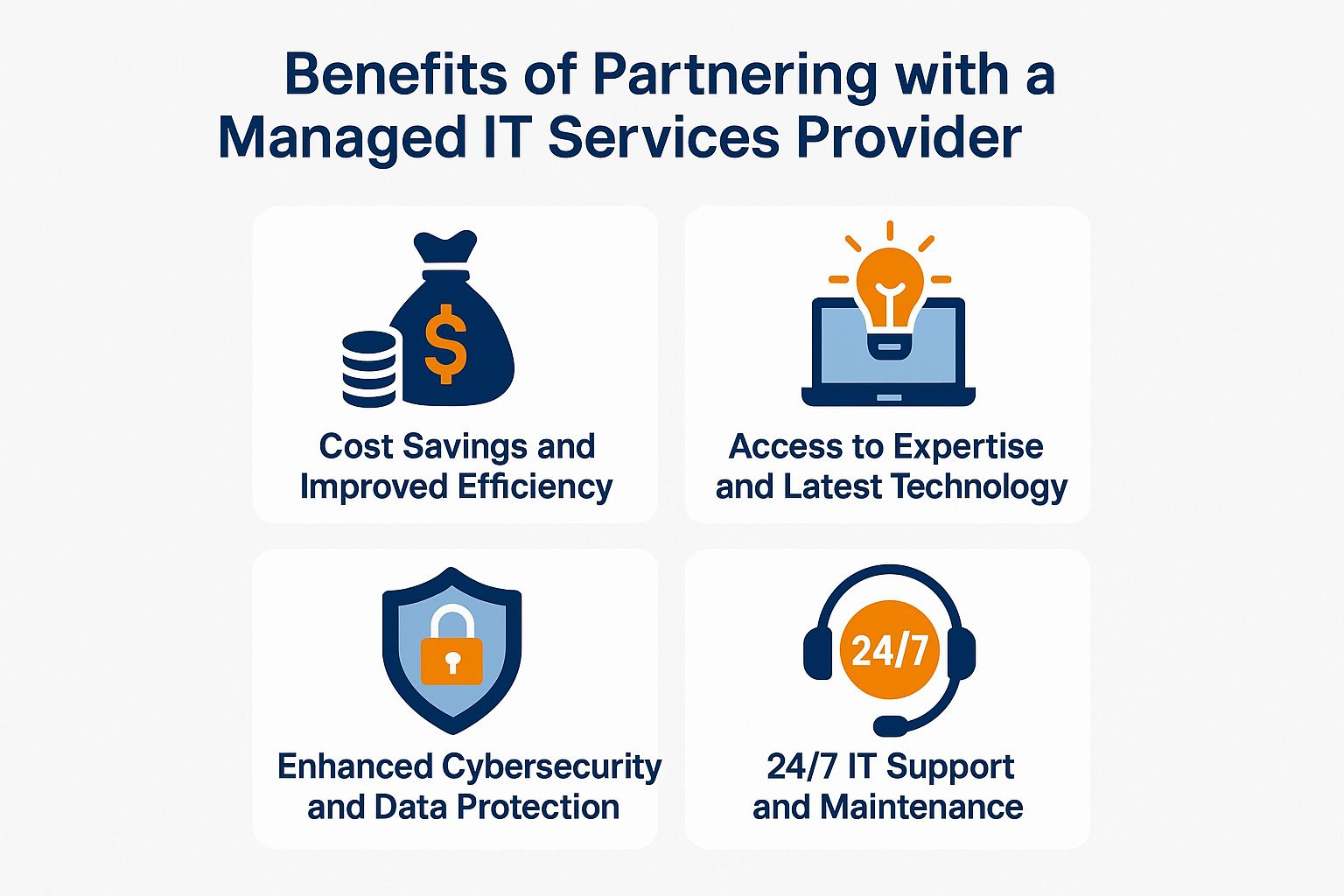
Cost Savings and Improved Efficiency
A key benefit of managed IT services is cost savings. They improve efficiency and allow businesses to spend their IT budgets on strategic projects instead of daily tasks. Outsourcing IT tasks to specialized providers helps organizations streamline operations, reduce costs, and focus on core functions.
This strategic shift allows businesses to leverage the expertise of managed service providers, who often utilize advanced technologies to deliver superior solutions. For instance, a retail company that implemented managed services experienced a 30% reduction in IT spending while simultaneously enhancing system performance and customer satisfaction.
By moving resources from routine IT tasks, like server maintenance or data backup, firms can invest in new projects and better security. This drives growth and efficiency.
Case studies showcasing the experiences of companies that have adopted managed IT services reveal not only significant cost reductions but also improved agility in responding to market changes, which is essential for maintaining a competitive edge.
Access to Expertise and Latest Technology
Partnering with a managed IT services provider gives organizations access to technical expertise and advanced technology. This drives innovation and supports digital transformation.
Customized IT consulting helps organizations use new technologies. These include artificial intelligence and cloud computing. This improves processes, decision-making, and overall productivity. For example, using cloud-based solutions gives businesses more flexibility. It also lowers infrastructure costs, allowing them to use resources better for core activities. As businesses strive for seamless operations, integrating IT services can provide a cohesive framework for managing these technologies, as discussed in our guide on integrating IT services for seamless business operations.
IT consultants help organizations use data analytics tools. These tools give valuable insights into consumer behavior. They also support personalized marketing strategies.
Ultimately, by harnessing these technological advancements, firms position themselves to thrive in a more dynamic market, promoting both innovation and long-term strategic growth through digital transformation.
Enhanced Cybersecurity and Data Protection
Managed IT services offer strong cybersecurity, network security, and data protection. These providers use advanced threat detection systems. They also have risk management strategies to protect sensitive information.
Today, threats come from many sources. Threats include phishing attacks, ransomware, and insider threats. This support is critical. Managed IT services adopt a multi-layered approach, incorporating firewalls, intrusion detection systems, and regular security audits to identify vulnerabilities before they can be exploited.
Continuous monitoring and incident response plans equip businesses with the agility to respond quickly during a breach, thereby minimizing potential damage and ensuring IT governance. By leveraging these technologies and strategies, organizations can enhance their security posture and build trust with clients and stakeholders who increasingly prioritize data privacy and integrity. If interested, you might want to explore how managed security services can protect digital assets in-depth here.
24/7 IT Support and Maintenance
A key benefit of working with a managed IT services provider is 24/7 IT support. This means businesses can get help desk and remote support anytime. This proactive maintenance approach addresses issues quickly. It minimizes downtime and helps organizations maintain productivity.
Having round-the-clock IT support means that potential disruptions can be identified and resolved at any time, which enhances the overall stability of the IT infrastructure and promotes service continuity.
Using Service Level Agreements (SLAs) sets clear expectations for response times and service quality. This promotes accountability from the service provider. These agreements are critical as they outline the parameters for support, enabling companies to concentrate on their core operations without the constant concern of unforeseen IT challenges, while ensuring business continuity.
Ultimately, the combination of proactive measures and strategic SLAs reinforces an organization’s resilience and ability to adapt in an ever-evolving digital landscape.
How to Choose the Right Managed IT Services Provider
Choosing the right managed IT services provider is crucial. It affects the organization’s IT strategy and performance.
This process helps ensure the chosen provider meets the specific needs and goals of the business. It also follows IT governance frameworks. For instance, understanding how managed security services safeguard digital assets can be an essential part of assessing a provider’s capabilities.
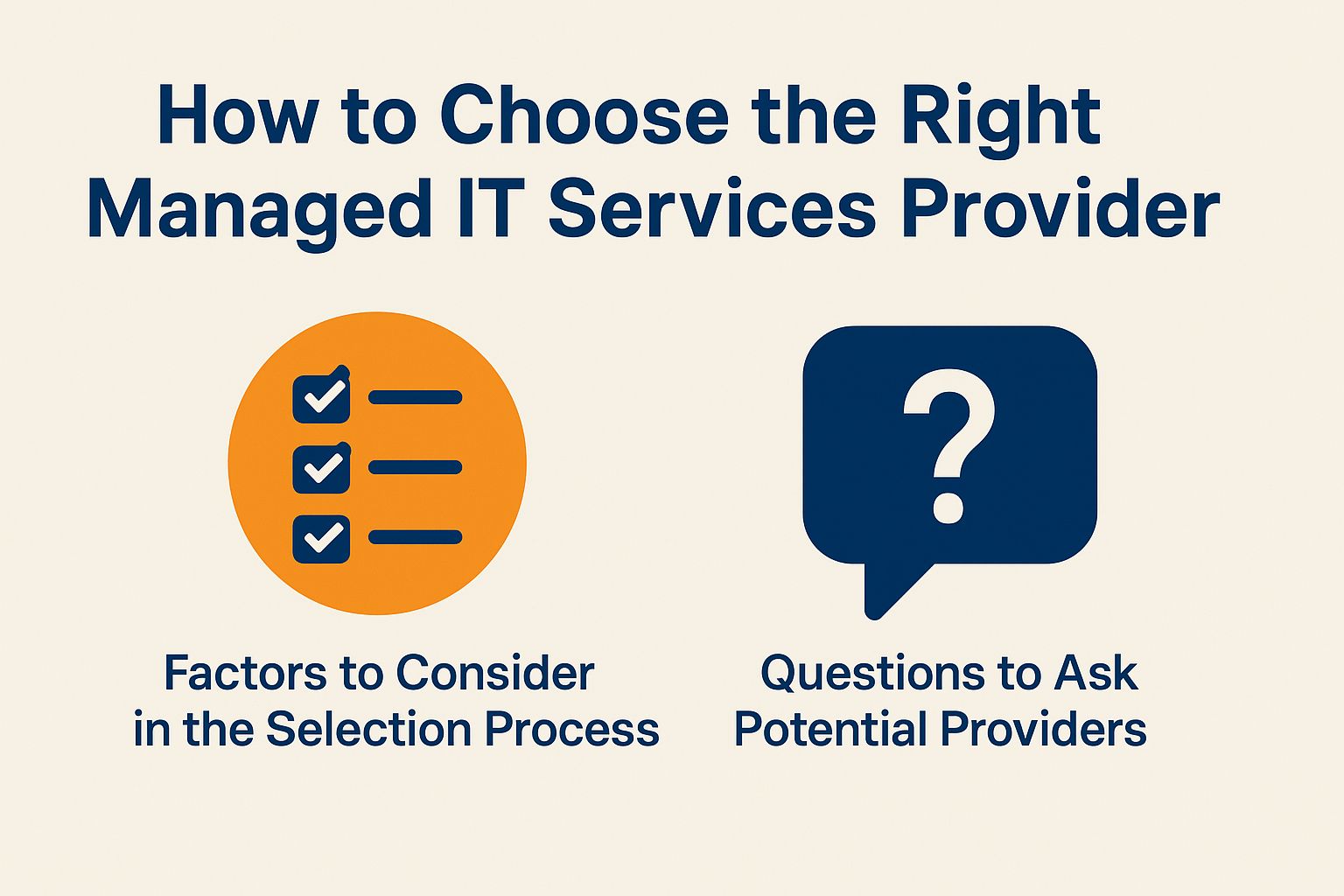
Factors to Consider in the Selection Process
When selecting a managed IT services provider, organizations should consider several critical factors, including the provider’s expertise in vendor management and their capacity to conduct comprehensive IT assessments that align with the organization’s overall IT strategy. Compliance with industry regulations and a proven track record in risk management are essential indicators of a reliable partner.
To evaluate a provider’s expertise, assess their experience in similar industries, vendor partnerships, and team certifications. A provider that has managed vendors in healthcare understands HIPAA requirements. This knowledge is crucial for compliance.
Organizations should look for evidence of past performance. Case studies and client testimonials can help gauge the provider’s effectiveness in service delivery. This approach not only ensures alignment of services with business objectives but also enhances confidence in the provider’s ability to mitigate risk while fostering a secure IT environment.
Key Questions for Potential Providers
Asking the right questions is essential when selecting a managed IT services provider. This ensures alignment with an organization’s specific needs. Key inquiries should concentrate on the provider’s technical expertise, the range of IT support services offered, and the intricacies of Service Level Agreements (SLAs), particularly concerning cybersecurity measures and alignment with IT strategy.
This helps organizations make informed choices. For example, inquiring about the provider’s experience with technologies relevant to the organization can indicate whether they are adequately equipped to manage unique technical challenges, leveraging their IT strategy to ensure comprehensive solutions.
Clarifying the scope of IT support services reveals potential gaps. These gaps could cause unforeseen issues later. Understanding the specifics of SLAs, including response times and support availability, is critical for evaluating how promptly the provider can address emergencies or system failures through effective incident management and risk assessment.
These questions help ensure that the provider delivers immediate solutions and long-term strategic alignment with the organization’s goals. They provide cloud services and outsourced IT support for better productivity.
Frequently Asked Questions
What are the benefits of partnering with a Managed IT Services Provider?
1. Improved Efficiency and Productivity: A Managed IT Services Provider helps businesses focus on core work. This leads to increased efficiency and productivity while improving performance and digital security.
2. Cost Savings: Partnering with a Managed IT Services Provider saves costs on hiring and training IT staff, buying equipment, and solving IT issues. This leads to better budget control and resource optimization.
3. 24/7 Technical Support: Most Managed IT Services Providers offer 24/7 technical support. This ensures quick resolution of IT issues, minimizing downtime and maximizing productivity.
4. Proactive Maintenance and Monitoring: Regular maintenance and monitoring by Managed IT Services Providers can prevent potential IT issues. This saves businesses time, money, and stress while providing IT asset management and cloud solutions.
5. Access to Latest Technology: Keeping up with changing technology can be hard for businesses. Partnering with a Managed IT Services Provider gives businesses access to the latest technology and expertise. This avoids the hassle of research and implementation.
6. Enhanced Data Security: Managed IT Services Providers have the expertise to implement cybersecurity measures. They protect businesses from cyber threats and data breaches with managed security services and disaster recovery planning.
